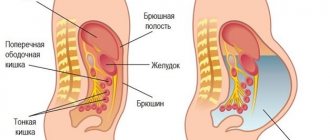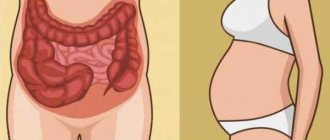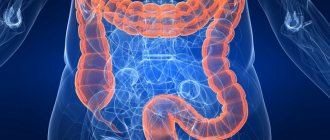Bloating in a child (flatulence) is an increased formation and accumulation of gases in the intestines, accompanied by various clinical manifestations. It occurs frequently and is observed at different ages - from infants to schoolchildren. It is not an independent disease. This is a symptom that means that a lot of gases have accumulated in the intestines, which distend its walls and cause pain or other unpleasant sensations. Most often it accompanies intestinal pathology or occurs for other reasons not related to disease.
Causes of gas formation
Normally, gas formation occurs constantly in the intestines. This is a physiological phenomenon that does not interfere with general well-being and goes unnoticed. The reasons for it are different:
- swallowing a certain amount of gases during eating;
- digestion of food, which is a chain of biochemical reactions of the breakdown of proteins, fats and carbohydrates with the release of gases;
- diffusion (gas exchange), when oxygen from the vessels of the intestinal wall, necessary for the normal functioning of some bacteria, enters the lumen, and carbon dioxide is removed by venous blood and excreted by the lungs;
- the vital activity of the intestinal microflora itself, which releases carbon dioxide during food processing.
Gases formed in a healthy body improve the digestion process: they enhance intestinal motility, help better “digestion” of food and rapid emptying of the intestines. But sometimes the mechanisms of gas formation fail, and the child develops signs of flatulence.
Causes of flatulence
The causes of bloating that cause poor health include various intestinal pathologies, which are divided into several groups:
- Diseases of the digestive system of an inflammatory nature (pancreatitis, inflammation in the intestines - colitis, etc./).
- Non-inflammatory (dysbacteriosis, enzymatic disorders) are diseases associated with disturbances in the digestion processes.
- Infectious diseases with intestinal damage - helminthiases, protozoal infections (amoebiasis, etc.), acute intestinal infections in which flatulence is combined with diarrhea.
- Congenital anomalies of the development and location of the large intestine - its elongation (dolichosigma) or increased mobility.
Flatulence also develops due to alimentary (food) reasons. The most common of them are: overeating, poor diet, consumption of large amounts of fat, carbonated drinks, foods that increase gas formation (legumes, brown bread, beer), and insufficient amounts of plant fiber in the diet.
Intestinal colic in premature and weakened children with signs of malnutrition occurs much more often than in healthy infants at birth.
Other factors
In addition to the above, there are other factors that lead to flatulence in infants. They are related to the nutrition of a nursing mother. Some foods cause gas in newborns:
- hot seasonings and spices;
- whole cow's milk;
- legumes, grapes, cabbage;
- black bread;
- carbonated drinks, etc.
Flatulence in children who are not breastfed, but are bottle-fed, can be caused by:
- formulas that are not adapted for feeding a child at this age;
- early complementary feeding;
- violation of the frequency and timing of the diet;
- psychogenic factors.
The mechanism of formation of intestinal bloating and pain during gas formation is directly related to overexcitation or stress. The release of adrenaline into the blood leads to vasoconstriction, which significantly reduces the excretion and absorption of gases. Stress also increases intestinal tone, as a result: peristalsis and movement of food slows down, fermentation and putrefaction processes intensify, and, therefore, increasing the amount of gas in the child. Seething, tight abdomen, cramps and diarrhea appear.
Causes of flatulence in children
In the first year of life, the baby still produces insufficient digestive enzymes, gastric motility is weak, so even with minor violations of the feeding rules, flatulence occurs. This may be too frequent and/or abundant feeding, incorrect balance of proteins, fats and carbohydrates, etc. In addition, infants swallow a lot of air when feeding, which also causes gas formation. Source: P.L. Shcherbakov Flatulence in children // Difficult Patient, 2006, vol. 4, no. 9, pp. 66-72
Other causes of gas in newborns:
- the process of adaptation of the body to life outside the womb;
- stress;
- age-inappropriate food;
- changing formula;
- overfeeding;
- introducing complementary foods too early;
- swallowing gas while crying or screaming;
- restless behavior, overexcitation, unstable emotional state;
- improper diet of the mother if the child is breastfed;
- prematurity;
- lactase deficiency;
- allergy to cow's or goat's milk protein;
- dysbiosis.
In children 2-4 years old, the reasons for increased gas formation are different:
- consumption of sweets, baked goods, white bread, foods with coarse fiber and starch;
- physical inactivity, inactive lifestyle;
- excess body weight;
- dysbacteriosis;
- congenital deficiency of digestive enzymes;
- stress, nervous tension;
- abuse of carbonated drinks;
- habit of chewing gum.
The psychological factor is very important for schoolchildren. Gases occur due to stress or psychological constipation, neuroses that affect the functioning of the gastrointestinal tract.
After 8 years the reasons are as follows:
- binge eating;
- physical inactivity;
- impaired intestinal motility, dysbacteriosis;
- neuroses;
- drug abuse;
- passion for “junk foods”, carbonated drinks;
- unbalanced nutrition, because from this age children already choose for themselves what they want to eat and what not, argue with their parents, refuse healthy food;
- intestinal infections.
Types of flatulence in older children:
- Disgestive. A consequence of a deficiency of digestive enzymes, the breakdown of undigested food remains by the intestinal microflora and, as a result, the release of large amounts of gases.
- Nutritional. Occurs when consuming gas-forming foods and drinks.
- Dynamic. It develops if the motility of the gastrointestinal tract is impaired, which leads to the accumulation of undigested food residues in the intestines.
- Dysbiotic. Explained by intestinal dysbiosis. The main reason is long-term antibiotic therapy, which suppresses the activity of microflora and stimulates the growth of colonies of foreign microorganisms. Source: N.L. Pakhomovskaya, M.M. Venediktova Flatulence: causes and ways of correction // Consillium Medicum. Pediatrics, 2021, No. 2, pp. 32-36
Manifestations of pathology in children
Severe gas formation in the intestines leads to the appearance of a foul odor, chronic abdominal pain, and uncontrolled release of gases (more than 20 times a day).
Increased flatulence is also manifested by an enlarged abdomen, acute paroxysmal or bursting pain in the abdomen, belching or hiccups.
Children suffer from increased flatulence very often and at any age - this is a common problem. But the most troublesome thing is bloating in newborns. At the age of approximately 5 months, the child’s body is characterized by an undeveloped digestive system - the absence of normal microflora in the intestines. In addition, infants have an undeveloped enzyme system, which will improve only by 4 to 5 months.
This also leads to fermentation in the intestines, resulting in bloating, spastic contraction of some parts of the intestine and relaxation of others, which is manifested by intestinal colic - sharp paroxysmal pain in the abdomen in an infant. The causes and treatment of this condition are always interconnected; an understanding of their mechanisms is necessary in order to know what medicine to give the child for flatulence and bloating.
Bloating in a newborn baby
The article was prepared by a specialist for informational purposes only. We urge you not to self-medicate. When the first symptoms appear, consult a doctor.
Content:
Abdominal bloating is common in most newborns. This common problem most often takes new mothers by surprise and frightens them. The fact that such a small and defenseless newborn is in pain makes parents feel at a loss, and the baby’s constant crying and kicking movements only increase anxiety.
The main reason for bloating in infants is that their intestines are not yet fully developed. Most often, this problem is accompanied by sharp abdominal pain, called colic. It is because of them that the baby cries. By six months the problem disappears, since by this time the intestines have time to “grow” along with the child, but before this age almost all children suffer from bloating.
Symptoms of bloating in a newborn baby
It is not difficult to notice that a child is bloated. The colic that occurs because of it does not allow the baby to lie quietly after feeding. This does not happen right away, but if some time after eating the baby turns red and begins to cry sharply, and presses his legs to his stomach or knocks them, then most likely he has bloating. The abdomen becomes firm and elastic.
Most often, the accumulation of gases occurs in the afternoon, and the intestinal spasm lasts only about half an hour. But if the baby screams without calming down for several hours in a row, then you should definitely consult a doctor.
Causes of bloating in a newborn baby
There are many reasons that can lead to bloating in a newborn. The main one is that by the time the baby is born, the development of his gastrointestinal tract has not yet been completed and it is difficult for the intestines to digest food, since there is a lack of beneficial bacteria that help digest milk. In addition, the baby eats more and more milk every day, and it is difficult for a not fully developed intestine to digest it.
It is also possible that the child’s body lacks lactase, a special enzyme that helps absorb lactose from breast milk. And with artificial feeding, perhaps the child is simply given a formula that is not suitable for him.
Also, the cause of bloating can be the incorrect position of the baby during feeding. If, while feeding your baby, you put him to the breast incorrectly, he will certainly swallow air, which will cause him discomfort. Avoiding colic for this reason is very simple: just hold the baby in an upright position to allow excess air to escape.
There are cases when mothers themselves harm their child by not following a lactation diet: by eating legumes, radishes, and other foods that increase the release of gases, or they begin early to feed the child with foods that are not the most favorable for this - apple or pear puree, which irritate the mucous membranes. intestines, thereby causing discomfort to the baby.
Sometimes bloating occurs due to E. coli or other pathogenic bacteria, which a child can pick up anywhere, from the maternity hospital, children's clinic and ending at home. As a result of their vital activity, these microorganisms increase gas formation in the intestines, leading to abdominal pain.
Treatment of bloating in a newborn baby
The body of a small child is still very weak and fragile, so treatment for him should be gentle. Most often, dill water or herbal teas made from chamomile or fennel are used to relieve the baby from bloating. You can also use special drops that reduce gas formation.
If a baby cries after eating, then most likely there is something wrong with the feeding process itself. Change your baby's position while breastfeeding and avoid eating foods that cause bloating.
Massage also helps speed up the process of passing gases. To do this, place the baby on his back and massage his tummy with gentle circular movements in a clockwise direction.
Do not forget that bloating can become not only a physiological problem. Young mothers, frightened by the baby’s continuous crying, become confused, panic, and thereby only make matters worse. Therefore, it is very important to calm the child. Place it on your stomach or pick it up and carry it. The uniform rocking and beating of the mother's heart will calm the baby, and he will quickly fall asleep. You can also put a warm diaper on the baby's tummy, after ironing it with an iron. In this case, the fabric should be pleasantly warm, not hot.
The appearance of bloating in a child does not mean that he is sick. Colic can torment even a completely healthy baby. But if he screams regularly, constantly and you can’t calm him down, then you should consult a specialist.
Author of the article:
Sokolova Praskovya Fedorovna |
Pediatrician Education: Diploma in general medicine received from Volgograd State Medical University. Immediately received a specialist certificate in 2014. Our authors
Symptoms in newborns
In general, the general condition of a child with increased gas formation is not disturbed: there are no delays in development and growth. Difficulties arise only with small children: it is impossible to find out complaints in a 1-year-old child and, even more so, in a newborn. But you can understand that your stomach hurts indirectly by the baby’s behavior:
- the child constantly passes gas;
- constantly screams, is restless, shows increased activity, does not sleep;
- does not take the breast;
- If you manage to feed it, it gets full quickly.
Due to strong gases in the intestines, the stomach swells even more. Regarding intestinal colic, which is the main symptom of flatulence at this age, there is a rule of “three”:
- appears in the third month of life;
- lasts up to three hours;
- finally disappears at the age of three months.
Causes
Many people ask why bloating and gas formation occurs in a baby, what causes and treatment methods exist? The cause of flatulence is not fully understood. In the first six months after birth, the baby’s weight doubles, while in the first year of life it triples. At the same time, many internal organs are not sufficiently developed. Some enzymes are not yet able to perform their functions fully.
Attention! Flatulence is normal in babies because the intestinal flora is still being established.
However, colic in babies has many causes. Usually the colic phase ends in the fourth month of life. Various phenomena lead to the formation of gases in the gastrointestinal tract, for example, lactose and gluten intolerance. Psychosomatic factors: stress, anxiety and tension in parents also play a role in the development of flatulence. It can also be provoked by a conflict between a child and his mother.
It is known that problems between parents lead to increased anxiety in the baby. Babies who cry a lot are more likely to swallow air, which subsequently causes colic of varying severity.
Symptoms in preschool children
In a 2-year-old child suffering from bloating, the following reasons come to the fore:
- consumption of large amounts of easily digestible carbohydrates: grapes, chocolate, baked goods, etc.;
- sedentary lifestyle;
- overweight;
- fermentopathy (insufficient production of lactase, which breaks down milk sugar);
- disturbance of intestinal microflora.
Similar reasons cause belching in a 3-year-old child, in addition to other manifestations of increased gas formation. But at this age, flatulence develops much less frequently than in children under one year old.
In a 4-year-old child, signs of flatulence appear from the first days of attending kindergarten. This is due to changes in diet, due to which the intestines undergo adaptation processes. A child’s hard belly, belching of air, and frequent passing of gases lead to stress, which in turn increases the process of gas formation.
In such cases, a mandatory consultation with a doctor is necessary to establish the causes of this condition and know how to deal with flatulence and bloating.
In a 6-year-old child, the causes and clinical manifestations differ little from those in the previous age category. May play a role:
- expansion of the diet, when more sweets and soda, raw vegetables are eaten;
- incorrect combination of products;
- chewing gum use;
- Great psychological stress and stress if the child starts attending school.
If a child develops a hard stomach and complains of rumbling, pain, and belching after eating, it is necessary to adjust the diet for gas formation.
Causes
In children under one year of age, flatulence occurs as a result of gas formation in the intestines. There is no microflora, a sedentary lifestyle, possible poor nutrition of the mother. Fermentation occurs in the body and gases are formed. The intestinal walls stretch, causing excruciating pain to the baby.
The main causes of flatulence in children under one year of age:
- When feeding, it swallows air along with food. Happens more often at lunchtime.
- Mom breaks the routine. Consumes prohibited foods (fatty, sweet, legumes, cabbage, cucumbers).
- Overheating or dehydration.
- Inappropriate mixture; babies should be fed with fermented milk mixtures.
- Allergy to milk protein.
- Infection, dysbacteriosis.
- Inflammation of the intestinal walls.
All reasons are valid. But the occurrence of flatulence can be prevented. After feeding, you will need to hold the baby in a column so that excess milk is burped and gas formation improves. It is better to wear it this way for 20 minutes. After eating, you should not put the baby to sleep or allow him to fall asleep. This provokes further torment.
Mom will need to reconsider her own nutrition. Wrong foods consumed by the mother – painful colic in the baby. It is recommended to monitor the baby’s condition so that he does not become overcooled or overheated. Offer more water, monitor the quality of the mixture and the reaction to it. If an intestinal infection occurs, consult a doctor immediately. Flatulence cannot be treated on its own; medications to relieve pain are prescribed by a pediatrician. You shouldn’t consult with pharmacists, it’s easy to do harm.
Causes of flatulence in teenagers and preschool children:
- Eating sweets in large quantities.
- Flour, fat, chips, cereal.
- Carbonated drinks.
- Dysbacteriosis or helminthic infestations.
- Digestion of food is not complete; there are insufficient enzymes for complete digestion.
To avoid flatulence in children 5 years of age and adolescents, it is recommended to monitor their diet. Put on a diet. Eliminate unhealthy foods from the menu. Check for pathologies of food digestion. Pass the necessary tests to identify dysbacteriosis and helminthic infestations. Drink more still water and herbal drinks.
Children prone to hysterics suffer from bloating. The excitability of the nervous system affects the digestive tract, food is poorly digested, and the baby suffers from colic. Such children need to be given more attention and protected from stressful situations.
First aid and treatment
First aid for bloating, which can be provided to a child at home, consists of the following:
- massage the abdomen clockwise;
- give the child dill water or Plantex - a herbal anti-flatulence preparation based on fennel;
- in case of ineffectiveness - simethicone (Espumizan, Infacol, Bobotik, Bebinos), which is a symptomatic remedy for bloating, removes gases from the intestines, but does not cure flatulence;
- if a child has constipation, leading to pain during gas formation, a glycerin suppository can be administered;
- as a last resort, use a tube to remove gases;
- in an older child with constipation leading to flatulence, a cleansing enema may be performed.
Important! Treatment of flatulence should be carried out exclusively under the supervision of a doctor. Self-medication is unacceptable, because often increased gas formation in a child occurs due to the development of serious diseases of the digestive tract (pancreatitis, colitis, dysbacteriosis), in the presence of helminthiasis, congenital intestinal pathology. Medicines that need to be taken for bloating are prescribed only by a doctor.
Therapeutic measures depend on the age of the child and the causes of the pathology. After determining the etiological factor (the reason that caused flatulence), anti-inflammatory treatment is carried out, and, if necessary, antibiotic therapy. Drugs are used to restore normal intestinal microflora, symptomatic therapy (antispasmodics for pain, laxatives, drugs that actively absorb gases).
A child has flatulence, what to do?
If your little one is diagnosed with bloating, then you need to know how to alleviate his condition. In general, it is recommended to consult a specialist who can determine the cause of this condition and prescribe appropriate treatment.
First aid
If a child has severe flatulence, it is important to consult a doctor immediately. And, in order to alleviate the baby’s condition at the moment, you need to know how to provide first aid to the little one.
It is recommended to take espumisan or nosh-pa (if the child is old enough for this medicine). In addition, chamomile or lemon balm tea will help alleviate the situation, but this is also true if your baby already drinks such drinks.
Sometimes it is recommended to perform a cleansing enema. In this case, they use water after boiling at a temperature of about 30 degrees, sometimes glycerin is also added to it, but you should not abuse such procedures and use them only in rare and most extreme cases.
It is important to understand that flatulence can be a consequence of intestinal obstruction or an infectious process, so you need to report this situation to the doctor, and he will be able to determine the cause of this illness in more detail.
Treatment
Your doctor may prescribe for you:
- A balanced diet, excluding foods that provoke increased accumulation of gases or fermentation in the intestines.
- If the causes of flatulence are dysbiosis, intestinal infection, or obstruction, then treatment will be aimed at getting rid of these ailments.
- There are special medications that help restore intestinal motility.
- You may also be prescribed beneficial bacteria supplements.
- In addition, the baby may be prescribed enterosorbents.
- To alleviate the child’s condition, pediatricians advise using a special tube to remove gases, which is inserted into the baby’s anus.
- Stroking the baby's tummy clockwise can help.
This light massage helped my son.
- Mom should understand that taking medications before the age of six months is undesirable. In this case, dill water is often prescribed and the mother eats foods that will help eliminate the increased accumulation of gases.
Prevention
Watch the video of Dr. Komarovsky - what to do if a child has a stomach ache:
Prevention of gas formation in the intestines, on the advice of Dr. Komarovsky, must begin long before the development of flatulence. A background correction of the measure is used to avoid the accumulation of gases in the intestines in 15% of children, if certain rules are followed:
- breastfeeding;
- strict adherence to the diet by a nursing mother;
- placing a small child on his stomach after feeding.
Older children need regular walks with active games, a favorable psychological environment at home, in kindergarten, at school, avoiding overeating, and following a diet. Following these simple tips will allow children not to encounter problems with flatulence.










